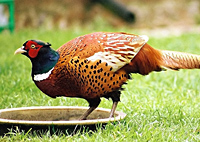
FSA Director of Food Safety Dr Alison Gleadle said: ‘This advice is targeted specifically at the small number of people who eat lead-shot game on a frequent basis. To minimise the risk of lead intake, people who frequently eat lead-shot game, particularly small game, should cut down their consumption. This advice is especially important for vulnerable groups such as toddlers and children, pregnant women and women trying for a baby, as exposure to lead can harm the developing brain and nervous system.
‘It’s important to remember that not all game is shot with lead. Generally, the large game sold in supermarkets is farmed and will have no or very low lead levels. Our advice is not applicable to consumers of such meat. People unsure about whether their game has been shot using lead ammunition should ask their supplier for information.’
This advice has been based on a study of consumers of wild game, conducted by the FSA in Scotland, and pre-existing data on lead levels in these types of food in the UK.
There is no agreed safe level for lead intake. Independent scientific expert groups across the European Union advise that exposure to lead should be reduced as far as possible.





